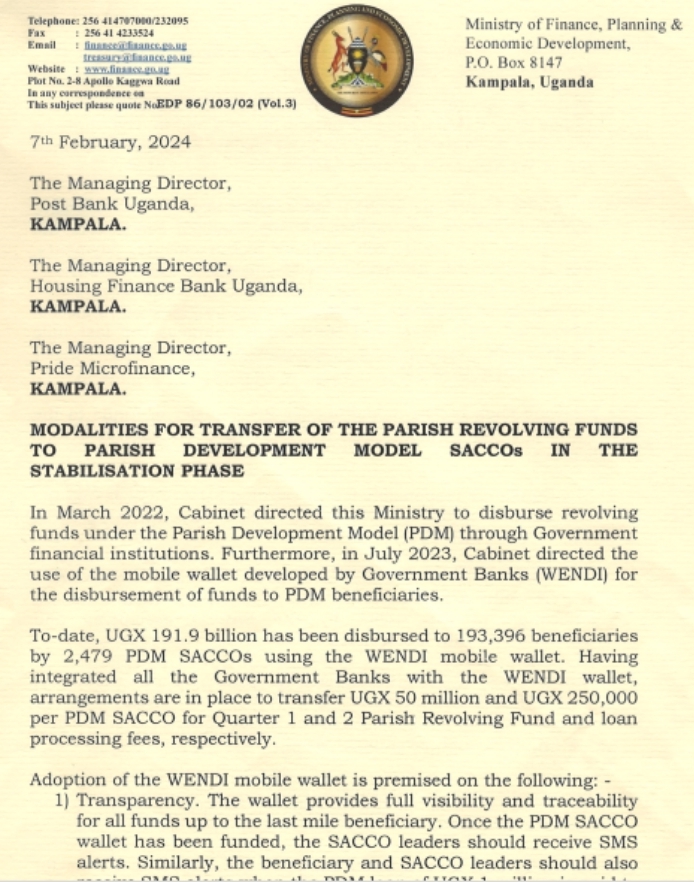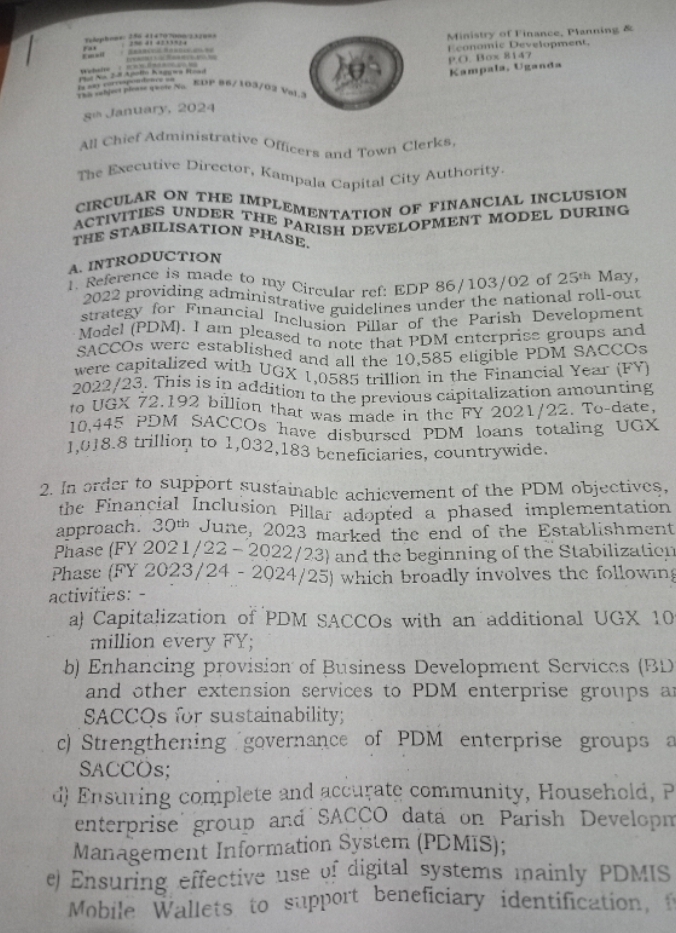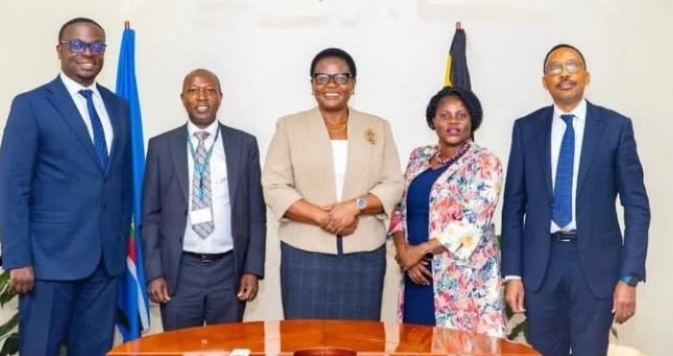The grand mafia plan to divert Parish Development Model cash from the known and tested channels (government Financial Institutions – FIs) of disbursement to the use of Wendi (an infant mobile wallet platform developed by Post Bank) may cause the government to lose billions of taxpayers’ money.
Since Wendi was launched in July 2023 to purportedly bridge the gap between the banked and unbanked population in Uganda, it has never been tested and may cause a huge financial loss due to the loopholes which some technocrats have already poked in its implementation.
To save the situation, some top NRM honchos who are cognizant with the well calculated plan to frustrate the progress of PDM activities and dent NRM steady progress have petitioned President Museveni to weigh in and arrest the situation before it gets out of hand.
Genesis
Whereas the government previously used 13 banks to reach out to the PDM beneficiaries across the country, the architects of the new mobile Wallet have scaled down the second phase 2 transactions to only three banks. The letters generated from the Ministry of Finance Planning and Economic Development (MOFPED) on January 8, 2024 and February 7, 2024 contradict the previous letter which the ministry released on December 19, 2022.
The first letter directed the MOFPED to disburse PDM funds through recognized Financial Institutions. These financial institutions made investments in providing digital tools to SACCOs and trained PDM enterprises to ensure that all participating FIs did comply in liaison with the Chief Administrative Officers of the respective local governments.
However, the January 8, 2024 letter which was signed by Moses Kaggwa on behalf of the PSST allocated this task solely to the computer illiterate SACCO leaders and the selected so-called government owned FIs which are not part of local government structures and lack the capacity to identity and recommend beneficiaries.
While the technocrats at the ministry of local government were trying to analyze Kaggwa’s motive, another intimidating letter was issued by the Permanent Secretary and the Secretary to the Treasury (PSST).
The February 7, 2024 letter which was signed by the PSST Ramathan Ggobi to the three selected banks (Post Bank, Housing Finance Bank and Pride Microfinance), he directs them to release all funds received to SACCO Wendi Accounts which are controlled by SACCO leaders within 24hours of receipt of funds. By empowering the SACCO leaders to release funds under their Wendi Accounts, the FIs and the Local Government have no control over what actions or errors the SACCO leaders take and this is likely to put the government at a risk of incurring heavy losses.
Whereas the accounting officers, RDCs, OWC officers, DISOs, Parish Development Committee (PDC) members and elected leaders at all levels were supposed to work together and enforce compliance with the PDM conditions, the PSST’s letter that came out barely a month after Kaggwa’ on January 8, 2024 trashes their relevance and gives all the authority and responsibility to the less trained SACCO leaders.
Although it is clearly indicated that beneficiaries should be paid individually through their personal accounts or mobile wallets, this is not compliant with the new Wendi system. The new Wendi system has ignored the interest that is supposed to be earned by the PDM SACCO in a revolving fund since the February 7, 2024 letter directs only 3 FIs to use Wendi which does not pay interest. Besides Wendi will charge Shs3750 net of taxes per transaction to the beneficiaries yet the same ministry had earlier asked the FIs to waive all charges under Phase 1 and only allowed a fee under Wendi. It should be noted that the Mobile telecom networks will still charge a separate withdrawal fee for customers to access cash.
It ought to be stressed that the selection of government owned FIs for onboarding the PDM SACCOs and the beneficiaries of Wendi mobile wallet ignores the existing local government structures yet the FIs have no capacity to determine the beneficiaries.
The three letters released by MOFPED contradict each other. Whereas the letter of December 19, 2022 requires participating FIs to use technology to reach the last mile beneficiary, the January 8, 2024 letter requires participating FIs to use Wendi to disburse funds and the letter of February 7, 2024 drops 10 FIs and retains only 3 to serve the PDM beneficiaries. This puts the MOFPED on spot for breaching key corporate governance principles. As the custodians of the funds, the MPFPED should desist from participating in determining who receives the funds. Their role is to ensure that the disbursements are made to the supervised FIs which were given the guidelines to follow.
Once the ministry of local government is tasked to independently engage communities to form SACCOs and enterprise groups and guide the process of determining the beneficiaries, it allows segregation of duties between the ministry of local government and ministry of finance and provides checks, balances and accountability.
The ministry of Finance is the implementing ministry and by forcefully coercing SACCOs and local government leaders to use selected FIs and the disbursement method is a potential conflict of interest and could lead to huge financial losses. As per the PSST’s letter of February 7, the local government structures were quickly and completely ignored, abandoned and rubbished. Owing to the fact that the Wendi Wallet system is not fully tested and its security is not known, a security breach on the platform has the capacity to wipe away the entire PDM disbursement without a trace.
This could result from the system manipulation by the users or the system failure. When the funds are deposited on the SACCOs wallet accounts, the FIs have no control and it will be up to the SACCO leaders or Wendi Wallet administrators to disburse the funds. At this stage, any form of accountability given is correct because there is no single person that is guaranteed to get PDM funds and hence none can claim not to have received their portion. This may aid an open window to mercilessly swindle the taxpayers’ funds without remorse or traceability. In the situation where the ministry that was in charge of developing the PDMIS wants to have control of the wallet, it is therefore very easy and fast to create or distort the audit trail.
The irony is that the PSST or the ministry of finance that is supposed to create a conducive environment for businesses to thrive and encourage creation of jobs hence economic growth, is writing contradictory letters to stifle banking industry growth and job creation processes. This is not only self-defeating but raises questions about the patriotism and foresight on government programs.
It is important to highlight that the dates of the cabinet meetings in which the purported directives were allegedly given are not mentioned and instead the ministry quotes references of other communications.
The proponents of the Wendi mobile wallet who want it as the only method of managing a nationwide government program do not appreciate the efforts of His Excellency the President to lift Ugandans out of poverty. The financial scandals that are likely to come out of this monopoly of taxpayers’ funds are likely to be the biggest liability to the NRM government and may leave a huge dent on the fight against corruption.
Some NRM cadres think that it may also turn out to be a political capital for the opposition leaders come 2026. The NRM cadres who have poked loopholes in the Wendi mobile wallet system call upon the government to carry out an independent investigation to satisfy itself that its own funds and taxpayers’ money is not being diverted by the elements within the ministry of finance to support opposition politicians and distabilise the successes of the NRM government in bringing prosperity to the people.
![]()
























